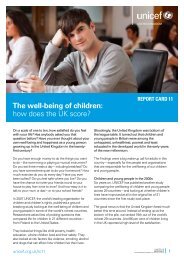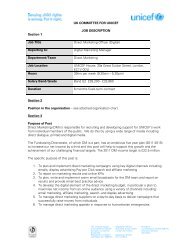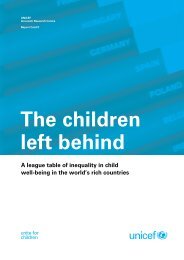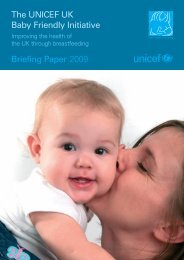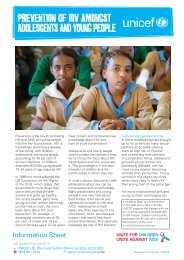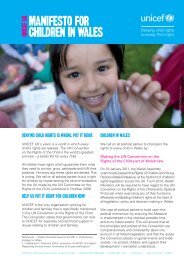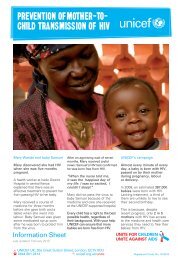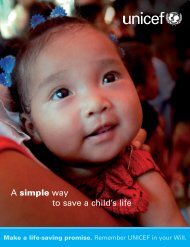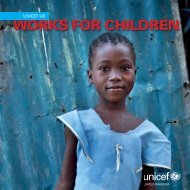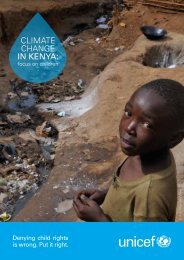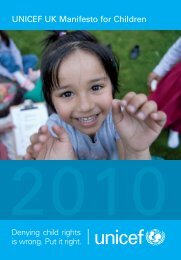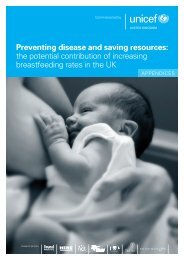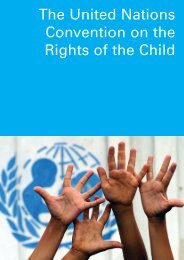UNICEF UK Trustees Report and Financial Statements 2010
UNICEF UK Trustees Report and Financial Statements 2010
UNICEF UK Trustees Report and Financial Statements 2010
Create successful ePaper yourself
Turn your PDF publications into a flip-book with our unique Google optimized e-Paper software.
The United Kingdom Committee for <strong>UNICEF</strong><br />
<strong>Report</strong> of the <strong>Trustees</strong><br />
For the year ended 31 December <strong>2010</strong><br />
<strong>and</strong> inspire all staff to be environmental champions. The actions we have taken<br />
include introducing energy efficient <strong>and</strong> motion sensitive electrical equipment,<br />
promoting cycling by staff, encouraging trains over planes, stopping the use of<br />
disposable items <strong>and</strong> switching to sustainable products, recycling as much as we<br />
possibly can, <strong>and</strong> composting our food waste.<br />
Instead of offsetting our carbon emissions, we compensate for them by funding<br />
<strong>UNICEF</strong> projects that help children affected by climate change via our Carbon<br />
Positive initiative. We spend at least as much on these projects as we would have to<br />
pay to offset our emissions.<br />
Children in emergencies<br />
For more than 60 years, <strong>UNICEF</strong> has been a leader in providing life-saving assistance<br />
<strong>and</strong> protection for children caught up in emergencies around the globe. With a<br />
permanent presence in more than 190 countries, <strong>UNICEF</strong> is poised to respond<br />
rapidly wherever <strong>and</strong> whenever disaster strikes, delivering life-saving help for<br />
children in the key areas of health <strong>and</strong> nutrition, water <strong>and</strong> sanitation, education,<br />
child protection, coordination <strong>and</strong> logistics.<br />
<strong>UNICEF</strong> <strong>UK</strong> committed £36.1 million to help the millions of children caught up in<br />
emergencies in <strong>2010</strong>. We supported humanitarian relief work in 24 countries <strong>and</strong><br />
regions. This sum includes £20.8 million from the Department for International<br />
Development (DFID).<br />
Our Children’s Emergency Fund is vital in our response to help vulnerable children<br />
caught up in under-reported or often completely ignored humanitarian crisis around<br />
the world. It allows us to deliver a rapid response to children in so-called ‘silent’<br />
emergencies that do not attract much media attention <strong>and</strong> where a public appeal for<br />
funds may not be appropriate or possible. The <strong>2010</strong> Alliance Ball raised £135,000 for<br />
the Fund. In August, <strong>UNICEF</strong> <strong>UK</strong> Ambassador for Humanitarian Emergencies Martin<br />
Bell visited Yemen to report on this largely forgotten children’s emergency. His<br />
article featured in the Mail on Sunday <strong>and</strong> a personal appeal to our supporters raised<br />
more than £140,000.<br />
Haiti, earthquake <strong>and</strong> cholera<br />
On 12 January, a massive earthquake hit the Caribbean nation of Haiti, killing more<br />
than 220,000 people <strong>and</strong> injuring 300,000. The disaster left tens of thous<strong>and</strong>s of<br />
children orphaned or separated from their parents. It affected 3 million people<br />
(30 per cent of the population), including almost 1.5 million children. It was a double<br />
disaster in the sense that it destroyed the infrastructure of what was already one of<br />
the poorest nations on Earth with the highest rate of infant mortality in the western<br />
hemisphere. The response from <strong>UNICEF</strong> <strong>UK</strong> supporters was overwhelming; by the<br />
end of <strong>2010</strong>, we had transferred nearly £9.7 million to help Haiti’s children.<br />
Within days, our supporters enabled <strong>UNICEF</strong> to deliver planeloads of life-saving<br />
health, nutrition, water <strong>and</strong> sanitation supplies for more than 250,000 children, giving<br />
crucial early prevention against child dehydration, disease <strong>and</strong> malnutrition. At the<br />
21



